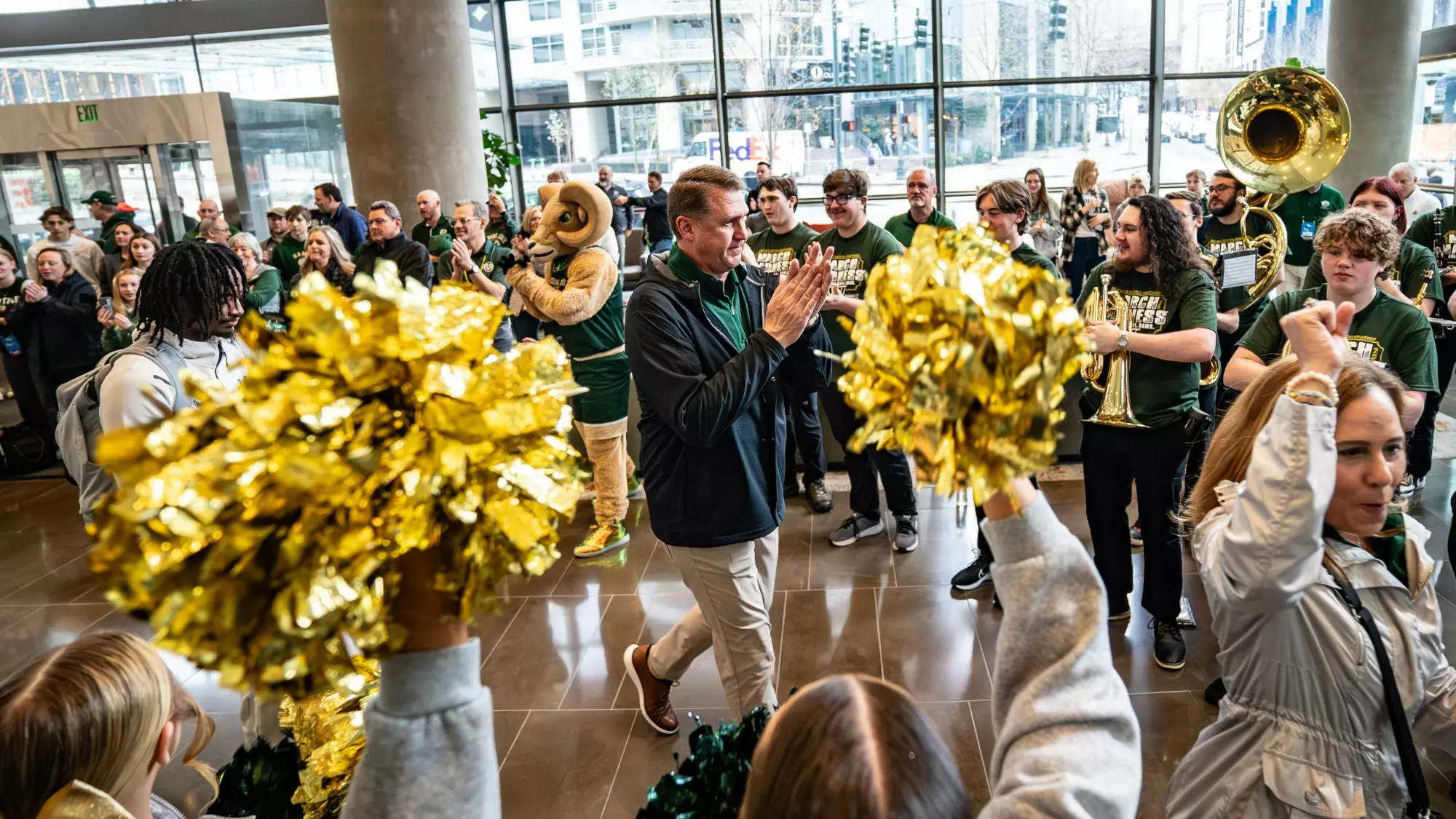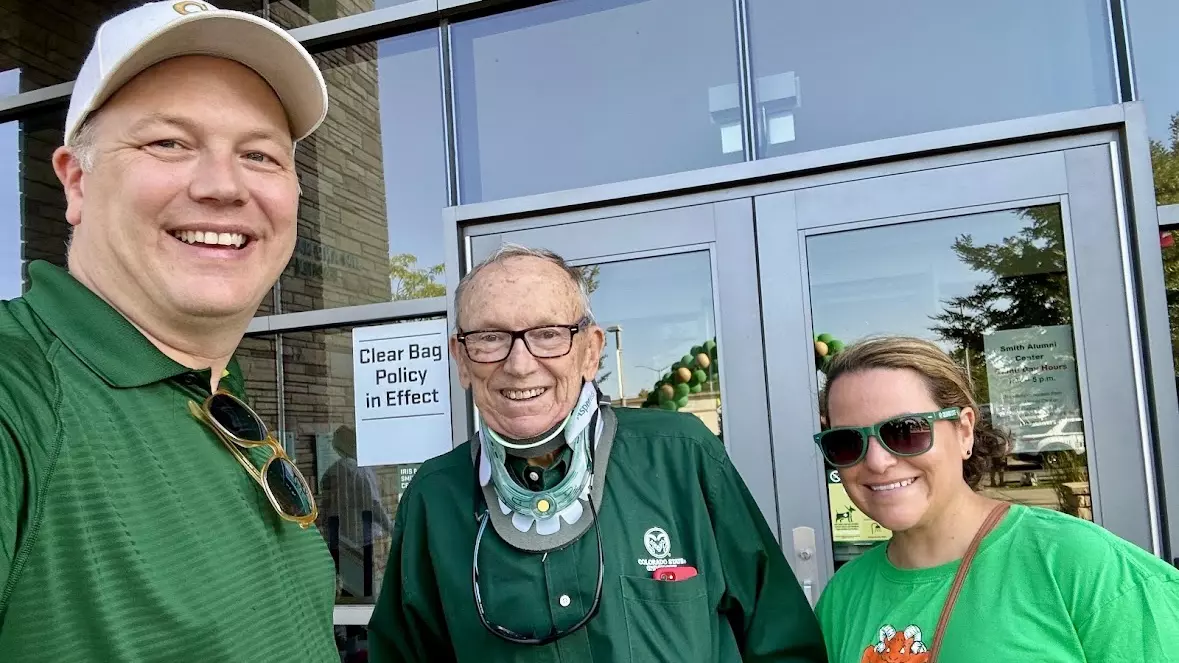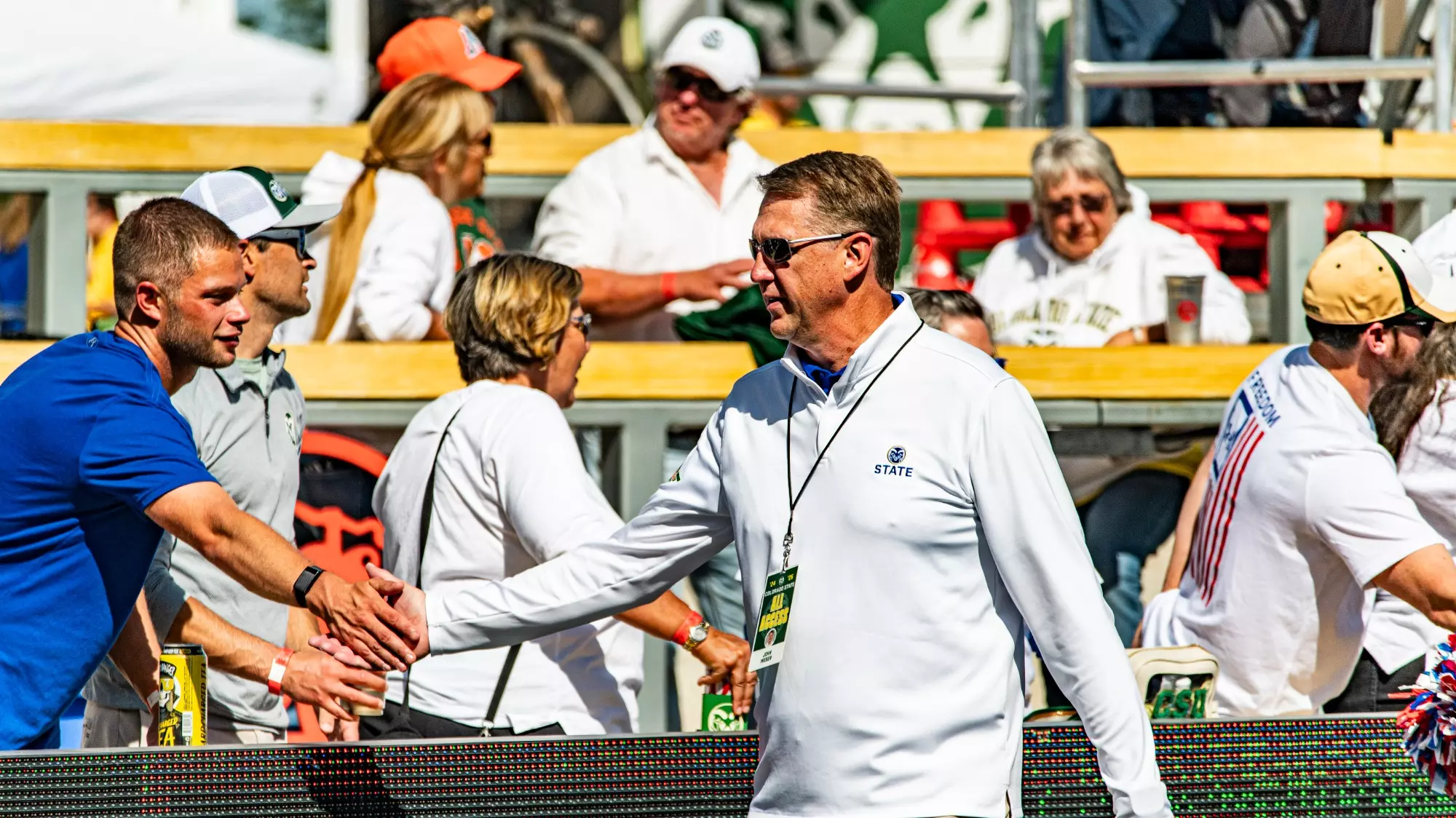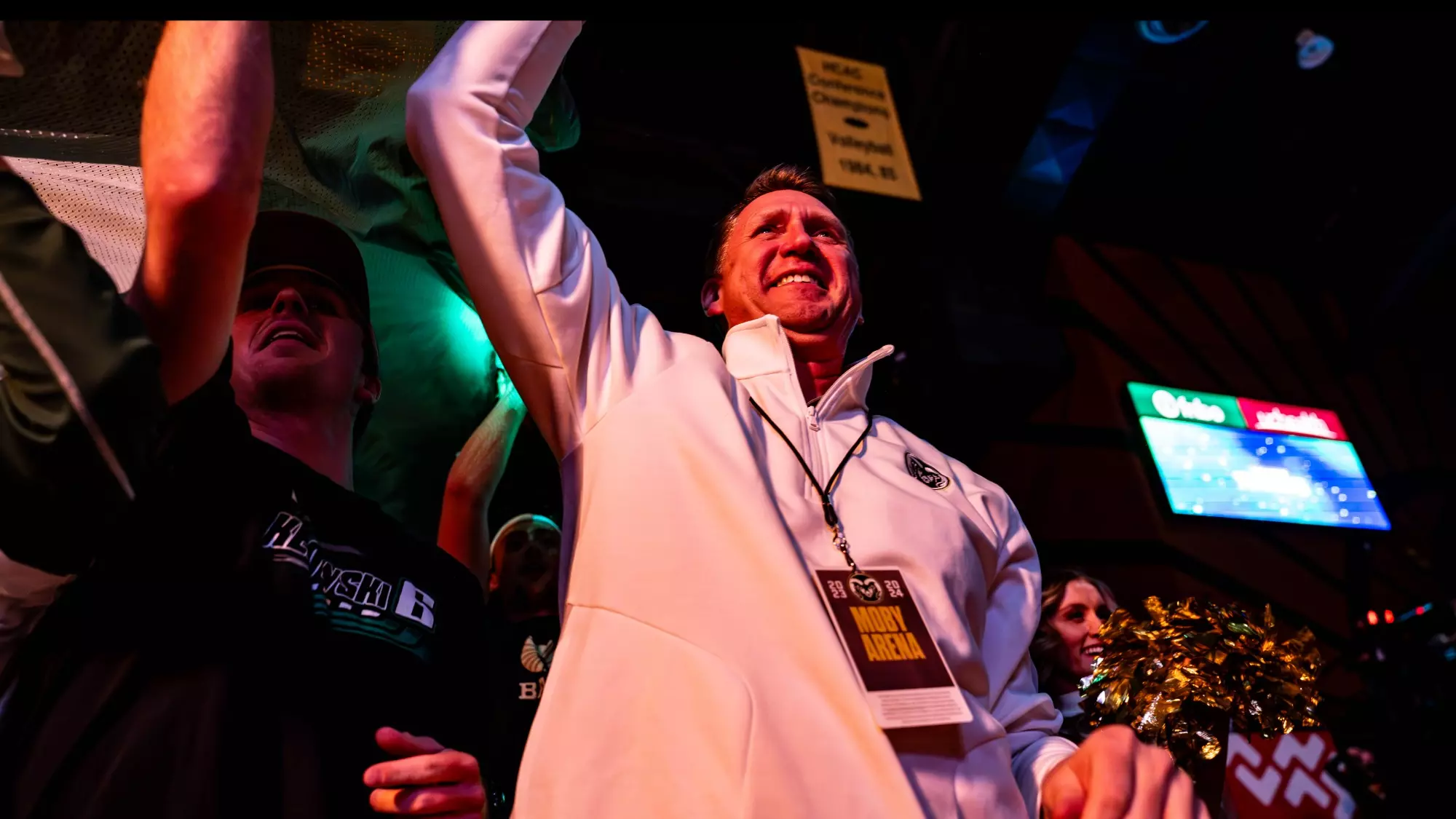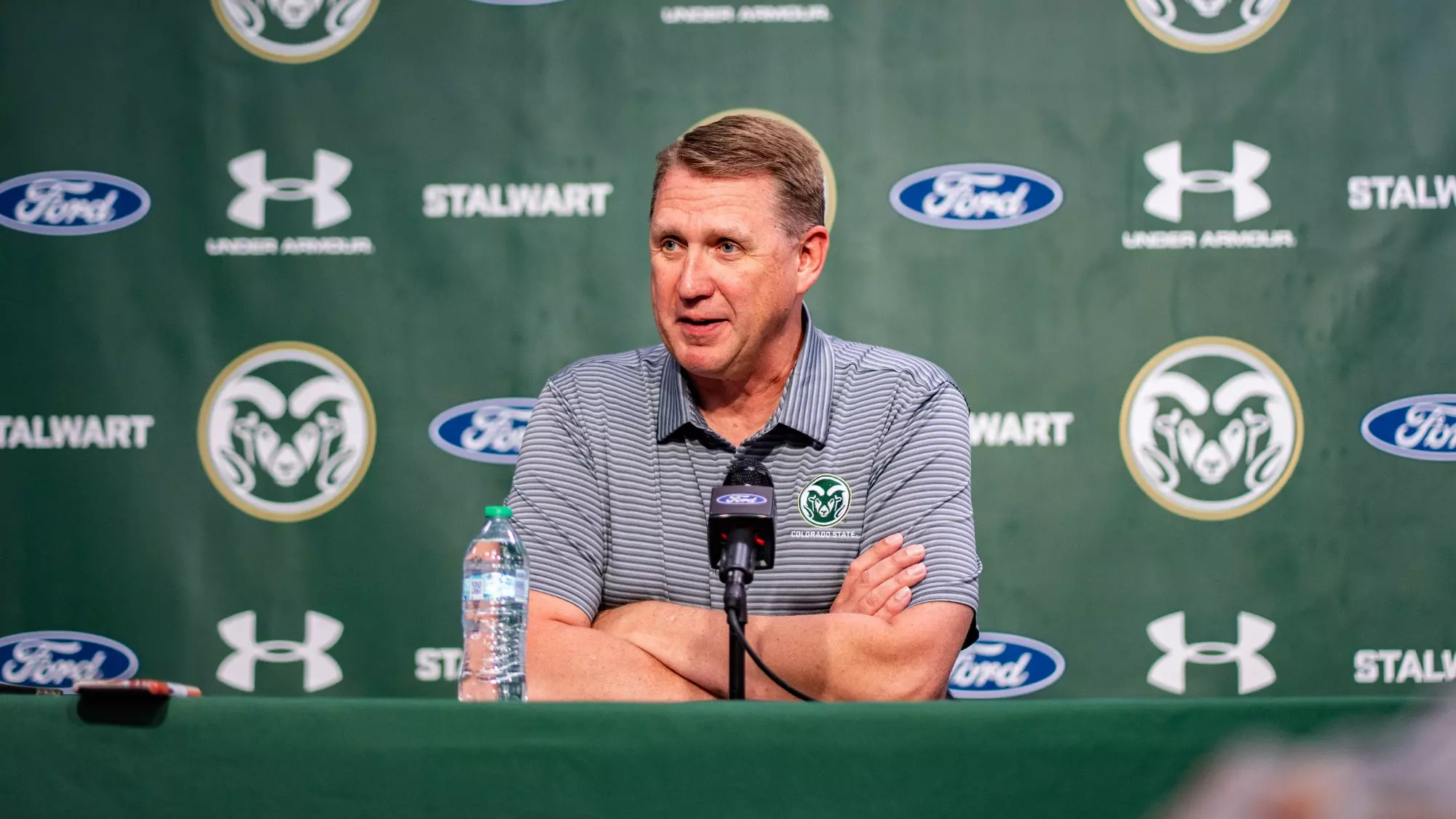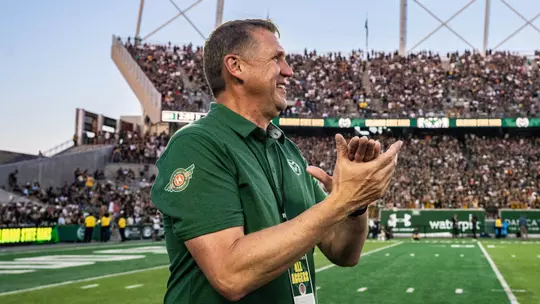
More Than Just a Social Experiment
Weber uses multiple platforms to engage with Ram Country
Mike Brohard
So, about that train horn …
Since becoming Colorado State’s Director of Athletics, one of the main targets for John Weber has been the game-day experience for the fan base. This is a common theme when he speaks to the coaches on campus and the support staff, the idea of going 2-0 on game day. Naturally, win the contest which has brought everybody together, but additionally win over the crowd. Make it an experience. Optimize their trip as the area has plenty of options for folks to choose how they spend their entertainment dollars.
A brainstorm can hit at any time. In a meeting. In the car on the way to work.
Then there’s discussion with others. Can this work? Will it work? Can the department afford it?
There are home runs, and there are swings and misses. Fans likely noticed the Battering Ram used a year ago is no longer in play at football games. Sometimes, something which sounds great in a conference room doesn’t execute as envisioned.
Or is too loud.
“We certainly tested it before we deployed it,” Weber said of the latest attempt to get the crowd riled up at Canvas Stadium, the horn blaring every third down. “But I will say the acoustics in a full stadium versus an empty stadium are very different. And until you actually have an opportunity to deploy a change like that in a real game environment, it doesn't matter how many times you practice it. You learn a little bit from practice, but you learn even more from when you deploy something in real time.”
Oh, he learned. Immediately, people were on social media complaining about how loud it was. Or how often it was used. Or both.
Most definitely both. And some took the time to tag Weber in their posts to make sure their feelings were seen. And it will be seen because Weber is active on social media. He will tease upcoming promotions and events. He even did so with the train horn, because he was excited about the addition – “there were people associated with other schools who assumed that it was some kind of Pac-12 announcement, and we're talking about a train horn.”
He knew the complaints were coming, because as much as he likes the train horn, he was on the television broadcast when it went off one time and he thought it was too loud. Twice during the game, the volume was adjusted.
Even still, the social posts kept coming. He read them, responding to some. Despite the feeling of some the sites have become more divisive than good, Weber knows there is some valuable information to be gained.
Aaron Harris was one of them. A 2003 Colorado State graduate, he’s been a season-ticket holder ever since, and he’s a donor to the athletic program. He’s invested in the programs, and at the very least, he just wants to believe his voice is being heard.
“I think it's pretty fantastic to have an athletic director, like John, who is willing to engage with fans, specifically because it's a way for the fans, for their voice to feel heard, but also it adds that kind of ownership stake,” Harris said. “College sports is totally different than a professional sports team because most people went to school there or have some affiliation with the university. In this case, the leadership of the organization is directly listening to the fans when there's constructive and on-brand ideas.
“I think that makes total sense. It's a little different than, say, a professional sports team where the owner of the Denver Broncos would never listen to a fan because he doesn't have to. He has the money. He controls the strings. But a university is totally different. Having somebody like John in place is really awesome because it's like, hey, something I suggest may be heard. Sure, he's going to filter through the noise and not deal with all of the wackadoo ideas that might be out there, but he's going to at least listen and see what's out there.”
Coming from the business sector, being the head of an athletic department was a bit foreign to Weber. Colorado State was not, nor were the fans, as he was a graduate himself. He knew what it was like to sit in the stands and take in the entire experience. He had ideas then, he had ideas when he was the head of the Green and Gold Guard.
Not all athletic directors will use social media, and there are not a lot of people in the position who are public in their activity. Some will see a post and get ahold of the person directly, be it through a text or email – not for the world to see.
A voice, even on social media platform, can be constructive. He’s smart enough to not engage every post directed at him, but if something catches his attention, he’s not afraid to respond.
“I think it's something you can do to get a pulse on fan feedback, donor feedback, alumni feedback, student-athlete feedback,” Weber said. “It's an opportunity where you can have some immediate engagement with folks, get immediate feedback from some folks, and it's a quick and easy way to to gain some feedback sometimes.
“People want to be heard. They want to have an opportunity to engage, provide feedback, and that's a good way for us to work back and forth in a very quick, easy, and informal way.”
You've got to be present. You've got to be accessible, and you've got to be able to provide real-time news and updates and be able to reach out to folks in a quick manner.John Weber
Recently, Weber noticed fans were on X talking about an old script the department used in the past, a script they liked and wished could come back in some way. Making no promises, Weber joined the conversation and said it could be a possibility in some way.
Another idea to consider. Same as when people suggested a longer tailgating experience. That led to changes.
People will approach him, giving their social media handles before their actual names. This is the world as it operates in the modern age, and Weber is not going to bypass any chance to improve in active discussion for the fans, the people he is trying to please.
That, in turn, makes his coaches happy. Ali Farokhmanesh isn’t afraid of social media either, and he’s glad Weber uses it as a positive tool to advance the department, especially the way he uses the channels.
“I think he's smart enough to know the difference between the good and bad, whereas people just are complaining or people are genuine, ‘hey, you could add this to the game-day experience, or you could take this away or turn down the volume on the horn.’ I think that's what a good leader does too, is try to get feedback from the people we're trying to reach out to, and that's our fan base,” Farokhmanesh said. “That's his personality too, and I think that's why he's a good leader: it's not his way or the highway.
“There are certain standards he holds everyone to and whatnot, but at the end of the day, he still listens for feedback and advice on different things or what people view. That's the best part. All those things he implemented, he's gone back to it, and not only with the fan base, but even with the coaches and everybody else, of getting their feedback on things too to make it that much better each time.”
Harris was at the New Belgium Porch during the game with a group of 30 other season-ticket holders he’s formed a friend group with. To a person, even from that distance away from the horn, their first thought was universal.
His first thought wasn’t to go directly to social media, which some did from the outset.
“To a person, every single person was like, ‘damn, this is too loud.’ I thought, honestly, the best way to do it is offer constructive feedback to somebody. If it's John Weber or anybody you may know in the athletic department, share it. Don't be a jerk about it,” Harris said. “Say, ‘hey, can we get turned down just a little bit? It's kind of disrupting my enjoyment of the game.’ I felt if you're totally fair about it and not a lunatic, go for it.
“I waited until after the game. During the game is not the time to ever engage with the athletic director.”
It wasn’t the first time Harris had reached out to Weber. He’s presented other ideas in the past, and they haven’t always agreed. That works for Harris because at least he feels he has a voice.
When it came to the horn, everybody was heard, and Weber personally responded to some. This is how he’s going to continue to do business. Weber knows not everything will be positive. He also can compartmentalize the realistic from those who are simply not happy in the moment. He feels good can come from all of it. If it is an arena where the Colorado State fan base will be, it is a place where he wants a seat.
To sit. To listen. To contemplate the path forward.
Farokhmanesh isn’t new to the campus even if he’s heading into his first season as the men’s basketball coach. He’s witnessed what has transpired at Canvas Stadium, and he knows the current administration has put as much effort into Moby Arena events.
A message sent at one venue is encouraging for the other.
“I think that's what's fun. When you go to a Denver Nuggets game, you go to those events, half of those crowds aren't even watching the basketball game,” Farokhmanesh said. “I think that's what you want it to get to, is a point where you come for the basketball game, and the winning, but you also come to be entertained. You know you're going to have a good time, and your family's going to enjoy the experience at Moby Arena, no matter what's going on on the basketball floor.
“I think that makes it a double win. That's 2-0.”
Winning in competition doesn’t come without effort, some sweat and blood spilled. Winning outside the arena is really no different.
“We have to be present. We have to engage. And that is part of when I talk about most loved, most watched, most innovative,” Weber said. “That's part of it. You've got to be present. You've got to be accessible, and you've got to be able to provide real-time news and updates and be able to reach out to folks in a quick manner. It's been helpful.”
So, about the train horn …
It is operated by air pressure, and during the game that was adjusted. Then again. Now that everybody knows what it sounds like in a full stadium, more adjustments were made before the second home game. Not just to the volume, but the volume of times it was employed.
Weber let Ram Country know by posting a video last Friday, a bit of a sly grin on his face as the horn accentuated the end of the clip.
Just like the train horn, the fans were heard. Loud and clear.
Support Colorado State Athletics: Tickets | Ram Club | CSU NIL Marketplace

